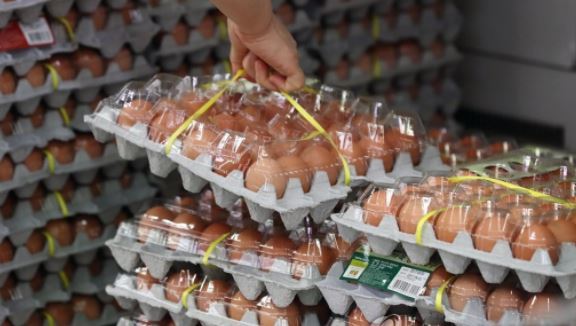[Newsmaker] Korean retailers stop egg sales after fipronil found in some eggs
By Shim Woo-hyunPublished : Aug. 15, 2017 - 11:43
Major Korean retailers, convenience store chains and online retailers decided Tuesday to immediately halt sales of eggs at their branches nationwide after the government warned of pesticide-tainted eggs earlier in the day.
It is unprecedented for all of the country’s major retailers to stop selling eggs simultaneously.
The companies include the nation’s three largest retail firms, E-mart, Homeplus and Lotte Mart, as well as leading convenience store chains CU, GS25 and 7-Eleven.

E-mart’s spokesperson said, “The company has not purchased any eggs from the farm that is currently accused of shipping contaminated eggs, but decided to stop sales as a preventive measure.”
Later in the day, Nonghyup’s Hanaro Mart, which operates 2,120 branches nationwide, also decided to halt all sales of eggs. Internet shopping sites including Coupang and Wemakeprice suspended sales of fresh and boiled eggs as well as food items with eggs, such as cookies.
The Ministry of Agriculture, Food and Rural Affairs found that a farm located in Namyangju, Gyeonggi Province, had delivered eggs contaminated with fipronil. The farm reportedly produced 25,000 eggs per day.
Fipronil is a broad-spectrum insecticide used to treat lice, fleas and ticks. Ingestion of small doses has few effects and requires little medical treatment, but it can cause liver, kidney and thyroid gland damage if taken in large amounts over time, according to the World Health Organization. The same pesticide has been found in eggs in 17 European countries.
The owners of the farm reportedly said in the inspection that they had used the substance upon hearing of its effectiveness in killing ticks and that they were not aware it was fipronil.
Another egg farm in Gwangju, Gyeonggi Province, was also found to have used above-recommended amounts of bfenthrin, an insecticide used against the red imported fire ant.
The owner of the farm reportedly said that they had used the insecticide to shoo away flies.
Amid the public’s growing concerns over possible contamination of eggs, the government released a sequence of measures throughout the day.
The Food Ministry immediately banned all shipments of eggs from local egg farms with at least 3,000 chickens. It also started to conduct inspections of local egg farms across the country.
“The ministry will put its utmost efforts to first finish inspections of the largest farms with over 200,000 hens in order to cope with the supply problem,” Kim said.
“Starting Wednesday, local farms will be able to resume supplying 25 percent of the normal supply level,” he added.
A ministry official said the nationwide inspections are expected to be completed by the end of the week. “Starting with the largest egg farms, the ministry will inspect every local egg farm in the nation.”
The Food Ministry will lift the shipment ban for farms that have no fipronil detected in their eggs upon inspection in order to cope with the supply problem.
Meanwhile, the Ministry of Food and Drug Safety is set to track the distribution channels of the contaminated eggs that the farm in Namyangju shipped out. It plans to recall and discard all such eggs upon locating them.
The egg industry enduring yet another crisis, following the spread of bird flu last winter and the mass perish of chickens from a recent heat wave.
Other related industries such as bakeries and restaurants are expected to be dealt a blow as well. Egg prices are expected to soar as the supply remains unstable.
The government, meanwhile, has decided to hold preventive education sessions on insecticides for egg farms.
The Korea Poultry Association has put up on its website a schedule for sessions to be held in the Gyeonggi, Chungcheong, Gyeongsang and Jeolla provinces from Aug. 22.
By Shim Woo-hyun (ws@heraldcorp.com)










![[Hello India] Hyundai Motor vows to boost 'clean mobility' in India](http://res.heraldm.com/phpwas/restmb_idxmake.php?idx=644&simg=/content/image/2024/04/25/20240425050672_0.jpg&u=)








